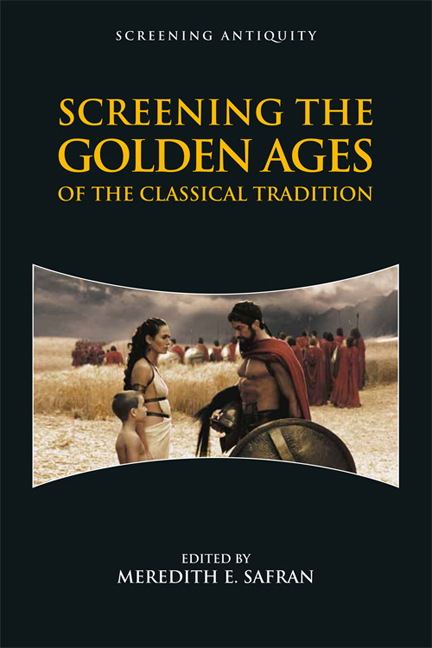Book contents
- Frontmatter
- Contents
- Series Editors’ Preface
- Editor's Acknowledgments
- Contributors
- Illustrations
- Abbreviations
- Introduction: Searching for Gold in an Age of Iron
- PART I THE GLORY THAT WAS GREECE
- 1 Re-(en)gendering Heroism: Reflective Nostalgia for Peplum's Golden Age of Heroes in Hercules: The Legendary Journeys 2.14 (1996)
- 2 Kissed by the Muse of Roller-Disco: Utopia versus the Golden Ages of America, Hollywood, and Classical Myth in Xanadu (1980)
- 3 Gilding American History through Song Culture in O Brother, Where Art Thou? (2000)
- 4 A Leonidas for the Golden Age of Superhero Films: The Thermopylae Tradition in 300 (2006)
- 5 The Dueling Greek Golden Ages of 300: Rise of an Empire (2014)
- 6 Confronting the Ancient Greek Golden Age in Jules Dassin's Phaedra (1962)
- 7 Pericles, Cincinnatus, and Zombies: Classicizing Nostalgia in The Walking Dead (2010–)
- PART II THE GRANDEUR THAT WAS ROME
- Filmography
- Bibliography
- Index
5 - The Dueling Greek Golden Ages of 300: Rise of an Empire (2014)
from PART I - THE GLORY THAT WAS GREECE
Published online by Cambridge University Press: 23 November 2019
- Frontmatter
- Contents
- Series Editors’ Preface
- Editor's Acknowledgments
- Contributors
- Illustrations
- Abbreviations
- Introduction: Searching for Gold in an Age of Iron
- PART I THE GLORY THAT WAS GREECE
- 1 Re-(en)gendering Heroism: Reflective Nostalgia for Peplum's Golden Age of Heroes in Hercules: The Legendary Journeys 2.14 (1996)
- 2 Kissed by the Muse of Roller-Disco: Utopia versus the Golden Ages of America, Hollywood, and Classical Myth in Xanadu (1980)
- 3 Gilding American History through Song Culture in O Brother, Where Art Thou? (2000)
- 4 A Leonidas for the Golden Age of Superhero Films: The Thermopylae Tradition in 300 (2006)
- 5 The Dueling Greek Golden Ages of 300: Rise of an Empire (2014)
- 6 Confronting the Ancient Greek Golden Age in Jules Dassin's Phaedra (1962)
- 7 Pericles, Cincinnatus, and Zombies: Classicizing Nostalgia in The Walking Dead (2010–)
- PART II THE GRANDEUR THAT WAS ROME
- Filmography
- Bibliography
- Index
Summary
The cinematic glorification of Sparta's famous stand at Thermopylae involves a fundamental problem: although Spartan self-sacrifice is memorialized as a moral victory achieved by the supreme military society of the Greek world, an Athenian-led naval victory at Salamis actually prevented Persian success. Furthermore, the historical outcomes of this victory most associated with “the glory that was Greece” – including democracy and the arts – were Athenian achievements anathema to Spartan culture, identified with the “golden age” or “classical” era, usually defined as the fifth century bce. The attempt to capitalize upon the success of Zack Snyder's Sparta-glorifying 300 (2006) via an ethically and aesthetically similar follow-up that dram-atized the Battle of Salamis, Noam Murro's 300: Rise of an Empire (2014; hereafter, 300: Rise), exemplifies the problem: if the Athenians can claim both Greek victory over Persia and the invention of the social and cultural institutions that flourished under Greek freedom, what remains for the Spartans?
The makers of 300: Rise attempt to thread this needle by representing Sparta, from the opening scene, as the most complete possible expression of the ideals of golden-age Greece, and the Athenians as inspired, though flawed, imitators of those ideals in both life and art. 300: Rise opens with a bronze sculptural relief of the fallen Spartans at Thermopylae, as they appear in death at the end of 300, which then slowly dissolves into the colors of flesh and blood – before cutting to the city of Athens in flames as Persian soldiers despoil its buildings and people. 300: Rise continues to achieve an unflattering comparison of Athens to Sparta in three ways: through its treatment of the Athenian cityscape, especially the destruction of the Acropolis’ monuments; by connecting the Spartans closely with the sculpture of the classical period most identified with Athens; and through how the famous sculptural program on the Parthenon effectively haunts the film's presentation of the battle between Athenians and Persians, complicated by the battle over which character will take Athena's place as the city's master or savior.
DUST IN THE WIND: MAKING AND UNMAKING ATHENS’ GOLDEN-AGE CITYSCAPE
The opening sequence of 300: Rise is noteworthy for its unusual depiction of Athens: not a conventional establishing shot of the city's majestic Acropolis, but its signature location in flames.
- Type
- Chapter
- Information
- Screening the Golden Ages of the Classical Tradition , pp. 101 - 118Publisher: Edinburgh University PressPrint publication year: 2018



